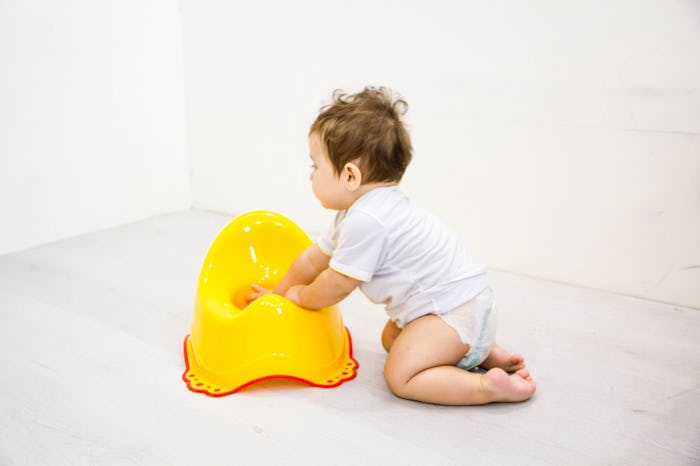Life

6 Potty Training Myths We're Flush Away
I dreaded the day I had to start potty training my toddler. As much as I wanted to get him out of diapers (especially with his little sister on the way) I really didn't know where or how to begin. I'd heard so much of what I now know to be myths about potty training, that it was utterly intimidating to take the first step.
The biggest mistake I made was reaching out for advice on my online parenting message board group. (You might remember message boards from the days before Facebook as a place where you'd go to connect with people with whom you had something in common.) In this case, they were moms who had a child the same age as mine. As soon as I asked for potty training help, I got 50 different pieces of advice, criticisms for waiting so long (he was two and a half), and opinions that I was starting too soon. I left the message board even more confused, and almost stopped there. But I couldn't. He was already giving cues that he was ready to use the potty, and I had to figure out what would work best for us.
One thing that I highly recommend is to learn fact from fiction when it comes to potty training. Here are some potty training myths you may have heard.
Myth #1: Boys Are Harder To Potty Train Than Girls
According to parenting and potty training expert Jamie Glowacki, boys are not harder to potty train than girls. In fact, Glowacki feels that boys may be easier to train because they can pee almost anywhere more conveniently than girls. Additionally, boys respond to linear and direct commands, while girls tend to be more social and respond better to talking and facial cues. Glowacki suggested that boys can be taught to go potty quickly by being given short and direct commands: “Go potty. Sit. Pee. Pants. Wash.”
Myth #2: Training Pants Make It Easier To Potty Train
According to Very Well, toddlers who are old enough to tell you when they need to go, or can go on their own without constant reminding, are probably ready for underwear. Toddlers who are used to diapers, typically don't have a problem with sitting in a soaked or soiled training pants, which defeats the purpose of using them and can actually make potty training take longer.
Myth #3: You Must Begin Potty Training By Age 2
Does your grandma get on your case because your 2 year old isn't already potty trained? This is probably because she was potty trained early. The American Academy of Family Physicians (AAFP) noted that in the 1940s, potty training began at about 18 months, likely due to lack of disposable diapers. Today, parents tend to initiate potty training somewhere between 21 and 36 months of age. Only 40 to 60 percent of children complete toilet training by age three, according to the AAFP.
Potty training is a developmental milestone that will only be successful when your child is ready, which may not be until age three or four. Glowacki, recommended switching from disposable to cloth diapers if your toddler seems completely uninterested in potty training. The feeling of wetness may help jump start his desire to use the potty.
Myth #4: Daycare Will Potty Train Your Child
I heard this so often when my kids were little, and I still don't know who started this myth. The reality is that daycares have vastly different policies when it comes to potty training. Some require your child to be fully potty trained, in underwear, with no accidents before moving up to the next room. Others insist on training pants, even if your child wears underwear at home during potty training. There are daycares that have scheduled potty breaks which may not align with your child's bladder, and those who actively look for cues to prevent potty accidents. The bottom line is, don't expect your daycare to take charge in potty training your child.
Myth #5: You Must Reward Your Child For Going Potty
A lot of parents begin potty training with a reward such as a sticker or candy. But, this incentive program doesn't always work, and often, it backfires. Glowacki noted that using the potty is a normal and expected behavior that doesn't require a reward, the same way kids shouldn't be given a prize for sleeping through the night or staying in their seat at the dinner table. At some point you will need to stop doling out M&Ms for going potty. When will that day be? Instead you can "reward" your child with a hug or a high five when he uses the toilet.
Myth #6: Once Your Child Is Potty Trained, He's Always Potty Trained
Kids who are potty trained can have regressions due to stress and medical conditions, according to Parents. Starting school, a bout with diarrhea, and being constipated are all common reasons for regression or accidents. Kids who are fully potty trained may continue to wet at night for several years, especially if they are heavy sleepers.